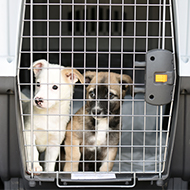Government warned of a possible 'pet crisis'

"We need the government to determine the impact COVID-19 has had on puppy farming, smuggling and unlawful selling of puppies and kittens."
The UK could face crisis in areas of pet welfare if warning signs are not addressed early, a report by national charity Blue Cross has concluded.
The report, Impact of COVID-19 on Pets and Owners, sets out recommendations for the government to protect pets and their owners as the country emerges from the pandemic.
It suggests that the government determine the impact of the COVID-19 outbreak on issues such as puppy farming, puppy smuggling and third-party sales of puppies and kittens.
The report notes that, at a time when less rehoming can take place, many animals are being purchased online without owners necessarily considering the long-term costs or commitments.
'Despite lockdown, there remains a high number of puppies available to buy online with over 400 adverts placed daily,' the report notes. 'The market for puppies remains strong: the prices of popular breeds like French bulldogs have risen over 40 per cent, from an average of £1,750 in 2018, compared to staggering prices today of an average of £2,500.'
Blue Cross head of public affairs, Becky Thwaites, commented: “Lockdown has been a time where many responsible breeders have not been producing and selling litters, due to the inability to breed safely and within government guidelines.
"This has provided a real opportunity for irresponsible breeders and sellers to take advantage, listing pets for sale and delivering them to homes or pick up points where buyers have not been able to see the mum or assess the health of their new puppy."
She added: "We need the Government to determine the impact COVID -19 has had on puppy farming, smuggling and unlawful selling of puppies and kittens.”
The report also raises concerns that some animal rescues could soon be forced to close, placing further pressure on the remaining rescue centres to step in and care for those animals.
A survey of rescue and rehoming organisations carried out by the Association of Dogs and Cats Homes (ADCH) found that 52 per cent of members said they had three months of income and reserves remaining, while 32 per cent had less than three months.
In light of this, Blue Cross is calling on the government to introduce legislation to regulate animal sanctuaries and to target investment in the sector to allow the provision of crucial support.
Other recommendations in the report include a call for the government to take forward the Animal Welfare (Sentencing) Bill and increase sentences for animal cruelty in England and Wales.
It also recommends that the Department for Environment, Food and Rural Affairs works in partnership with the devolved administrations to undertake a thorough and wide-ranging assessment of the impact of the outbreak on animal welfare across the United Kingdom.



 The latest
The latest